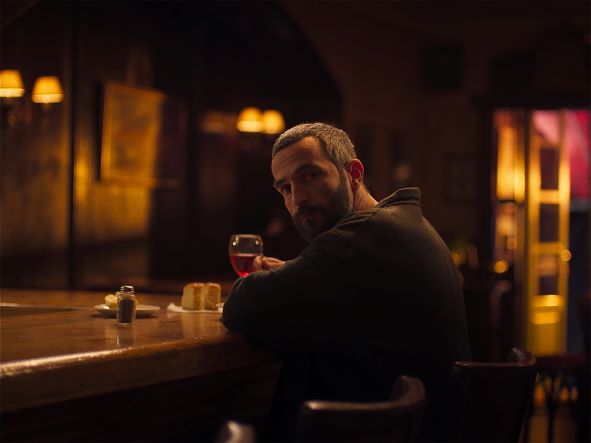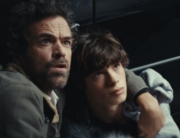A dystopian drama of amnesia and new identities, Christos Nikou’s directorial debut is the latest example in the so-called Greek Weird Wave. Here, a mysterious affliction saps the memories of the populace, and specific experiences are medically prescribed to rebuild the personalities of these lost souls.
Found at the end of the line on a bus with no recollection of what he’s doing there or even who he is, middle-aged Aris, credibly played by Aris Servetalis (Alps), is brought to the Disturbed Memory Department of a neurological hospital, where he’s deemed an unidentified person. With no documentation or friends or relatives to claim him, he’s given the opportunity to create new memories with the guidance of a series of recordings. This peculiar method of recovery is called “Learning How to Live.”
Settled into a tidy apartment with some spending money, Aris lives his days adhering to instructions from a deep voice coming from a cassette player that directs him to ride a bike and then to progress with more sophisticated assignments, like dressing up for a costume party or going to a strip club. Each event must be chronicled with Polaroid selfies that are kept in a photo album to indicate his advancement to the doctors. In another task, which requires him to help a dying person, Aris feeds soup to a hospitalized man with dementia, and the semblance of Alzheimer’s disease echoes the story line of a memory disorder that strikes randomly and has no cure.
At an undertaking to see a movie, which happens to be The Texas Chainsaw Massacre, Aris encounters Anna (Sofia Georgovasili), who is being similarly rehabilitated, but is ahead of him in the process. Things turn complicated when she is instructed to have a one-night stand with a stranger, and he’s unaware their encounter is an assignment.
Aris’s inner reflections are only exposed through his actions, as dialogue is minimal. The title comes from the shiny red apples he buys regularly, until his local grocer (filmmaker Babis Makridis) tells him that the fruit is good for memory, and he reacts in a surprising way, by abandoning his regular treat. He presumably prefers to forget the past and is enticed by a fresh beginning.
Shot in a boxy 4:3 aspect ratio, cinematographer Bartosz Swiniarski’s stunning visuals match the austerity of the 91-minute story. With chilly geometry, his crisply composed scenes highlight the sterile world of alienation. A soundtrack that includes the songs “Scarborough Fair,” “Sealed with a Kiss,” and “Let’s Twist Again” adds to the retro ambience and droll undercurrent.
Thirteen years ago, Dogtooth, by Yorgos Lanthimos, propelled this offbeat film genre when it won a prize at the Cannes Film Festival and received worldwide recognition. Nikou served as assistant director on that film (as well as Richard Linklater’s Before Midnight, filmed in Greece) before co-writing Apples with casting director Stavros Raptis (Crimes of the Future, The Durrells).
Like others in the assortment of idiosyncratic Greek films, Apples is formally rigorous with orderly environments and opaque emotions that belie deadpan humor. Game-like situations and unique rules govern the realm, notably similar to Athina Rachel Tsangari’s Chevalier, which used unconventional challenges in a contest of male superiority on a fishing trip.
Made before Covid-19, the unintentionally timely pandemic-themed Apples had its world premiere at the 2020 Venice Film Festival. Jury president Cate Blanchett was so moved by the film (programmed outside the main competition) that she came on board as an executive producer a few weeks later.







Leave A Comment